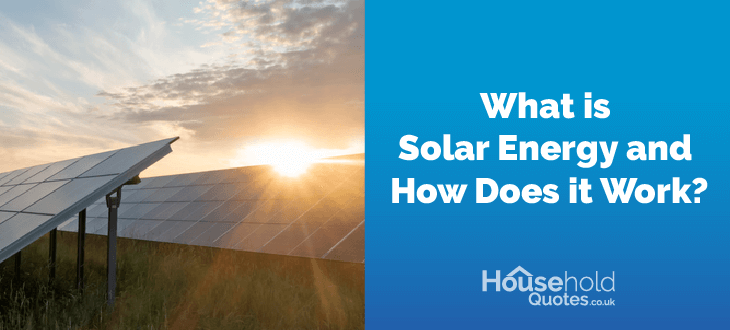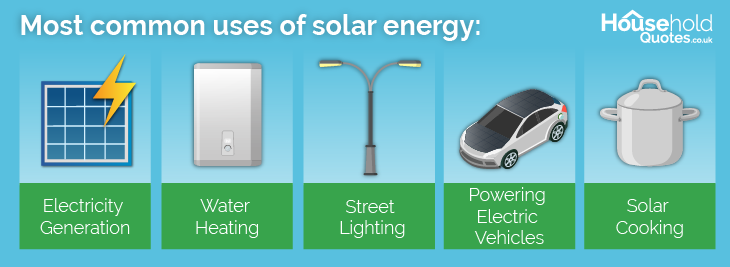Answer these simple questions and we will find you the BEST prices
Which type of solar quotes do you need?
It only takes 30 seconds
100% free with no obligation

Get up to 4 quotes by filling in only 1 quick form

Compare quotes and find yourself the best deal

Increase the value of your home by installing solar panels
- Householdquotes.co.uk
- Solar Energy
What is Solar Energy And How Does it Work?


- Solar energy is a clean and renewable source of energy which is generated from the radiation emitted by the sun.
- Solar energy works by converting sunlight into electricity and heat energy.
- It is commonly used for generating electricity and used for indoor and water heating.
Solar energy is one of the most popular sources of renewable energy in the UK right now, with over 900,000 households already equipped with solar panels. An average 400-watt solar panel receiving 4.5 peak sun hours per day can produce around 1.8 kWh of electricity daily and 54 kWh monthly.
Numerous government grants are also available for solar panels in the UK, in line with the country’s goal of becoming net zero by 2050. In this short guide, we will explain exactly what solar energy is, how it works, and its common uses.
Do you also wish to join the growing number of households benefiting from solar energy?
Simply fill out our 30-second form to receive up to 4 free and non-binding quotes from our network of vetted solar experts. Click the button below to begin!
- Quotes from local installers
- Payment by finance available
- Save up to £915 per year
It only takes 30 seconds

What is solar energy?
Solar energy is radiance emitted by the sun which is used to generate electricity and thermal energy. The electromagnetic radiation from the sun is converted into usable forms of energy with the help of different technologies such as solar panels and solar thermal systems. The four main types of solar energy are photovoltaic, solar thermal, concentrated, and passive.
How does solar energy work?
Solar energy works by converting sunlight into electricity through a process called the photovoltaic effect. Electricity is the flow of electrons around a circuit. So, how does solar technology work? Here's a breakdown of the process:
- Light absorption: Solar panels are made up of photovoltaic (PV) cells which absorb photons from sunlight. These PV cells are typically made of silicon or other semiconductor materials. There are two layers of silicon in the PV cells, one is positively charged and the other is negatively charged.
- Electron excitation: When photons from the sunlight hit the solar cells, they affect/excite the electrons in the silicon atoms, causing them to break free from their orbits.
- Electric field generation: As the electrons move, they create an electric current. This happens because the solar cells are designed to create an electric field that pushes the electrons in a specific direction.
- Current flow: The excited electrons flow from the positive layer to the negative layer because of the electric field, generating an electric current.
- Voltage creation: This movement of electrons creates a voltage difference between the two layers of the solar cell.
- Electricity generation: The combination of current and voltage results in power generation. A typical silicon solar cell can generate voltages up to 0.5V and currents up to 6A, with a maximum power of about 3W.
- Scaling up: Since a single solar cell's output is small, multiple cells are connected in series and parallel to form solar modules and panels, increasing the overall power output.
- Conversion to usable electricity: The direct current (DC) electricity generated by solar panels is then converted to alternating current (AC) by an inverter for use in homes and other buildings.
Is solar energy renewable?
Yes, solar energy is a renewable energy source. This is because its main source of energy — the sun, is a limitless resource. So, as long as the sun shines, there will be solar energy. Unlike other energy sources like fossil fuels, there is no danger of depletion or scarcity with solar energy.
However, there are numerous solar energy advantages and disadvantages to consider when determining its viability as a power source.
Types of domestic solar energy
When it comes to harnessing solar energy for domestic use, two primary systems are commonly employed: solar photovoltaic (PV) systems and solar water heating systems. Each serves a distinct purpose and offers unique benefits.
- Solar photovoltaic (PV) systems: These systems convert sunlight directly into electricity. They are versatile and can be configured in various ways to meet different energy needs.
How PV Systems Work:
- Solar Panels: Made up of photovoltaic cells, typically silicon-based, these panels capture sunlight and convert it into direct current (DC) electricity.
- Inverter: This device converts the DC electricity generated by the panels into alternating current (AC), which is the form of electricity used in homes.
- Metering: A net meter tracks the electricity produced and consumed, allowing excess electricity to be sent back to the grid or stored in batteries.
So, are solar panels a good investment and do solar panels add value to your home? Yes, solar panels are a great investment and increase your property’s value. The solar panel efficiency in UK, which is between 18% and 22% for residential solar panels and up to 25% for commercial solar panels, makes them a great addition to your property.
2. Solar water heating systems: use solar energy to heat water for domestic use, such as bathing, washing, and space heating.
How Solar Water Heating Systems Work:
- Solar Collectors: These are typically installed on the roof and capture sunlight to heat a fluid, either water or a heat-transfer fluid.
- Heat Exchanger: The heated fluid is circulated through a heat exchanger, where it transfers its heat to the water stored in a tank.
- Storage Tank: The heated water is stored in an insulated tank until it is needed.
Are you interested in installing solar energy systems in your house? Are you wondering how much do solar panes cost, what are solar panel dimensions or how many solar panels to power a house?
An expert can help answer all these questions. Thankfully, you do not have to waste hours of your time searching for installers on your own. We can help you get quotes from reliable solar installers easily!
Simply fill out our 30-second form and get up to 4 free and non-binding solar panels and battery quotes. Click the button below to begin!
- Quotes from local installers
- Payment by finance available
- Save up to £915 per year
It only takes 30 seconds

What are the most common uses of solar energy?

Solar power can be used for a lot of different purposes. Some main uses of solar energy are listed below:
1. Electricity Generation
Solar energy is primarily harnessed for electricity generation through photovoltaic (PV) systems. This clean energy source reduces reliance on fossil fuels, lowers greenhouse gas emissions, and can lead to significant savings on electricity bills. Solar energy systems can be integrated into building designs (building-integrated photovoltaics) and even used in large-scale solar farms that contribute to the grid.
2. Water Heating
Solar water heating systems capture sunlight to heat water for residential, commercial, and industrial applications. This method is particularly effective for providing hot water for domestic use, such as bathing, cleaning, and cooking, and is an efficient alternative to conventional electric or gas water heaters. Solar water heaters can significantly reduce energy costs, especially in sunny regions.
3. Street Lighting
Solar-powered street lighting is an innovative application of solar energy that enhances public safety and reduces energy costs. These systems use solar panels to charge batteries during the day, which then power LED lights at night. Solar streetlights are particularly beneficial in remote or off-grid areas where extending electrical infrastructure can be costly. They contribute to energy savings, reduce carbon footprints, and improve urban aesthetics without the need for extensive wiring or maintenance.
4. Powering Electric Vehicles
The integration of solar energy into the transportation sector is gaining momentum, particularly through the use of solar panels to power electric vehicles (EVs). Solar charging stations can be installed in parking lots, homes, and public spaces, allowing EV owners to charge their vehicles using clean, renewable energy. This not only reduces the carbon emissions associated with traditional gasoline-powered vehicles but also promotes energy independence and sustainability in transportation.
5. Solar Cooking
Solar cooking harnesses the sun's energy to cook food, offering a sustainable alternative to conventional cooking methods that rely on gas or electricity. Solar cookers, which can be simple box designs or more advanced parabolic models, capture and concentrate sunlight to reach cooking temperatures.
Now, after going through this guide, if you think solar energy is the right solution for your home, we can help you with finding experts who also offer the best quotes for solar installations.
With our service, you can save hours of time you would have spent on research. All you need to do is fill out our 30-second form to get up to 4 free and non-binding quotes.
Click the button below to begin!
- Quotes from local installers
- Payment by finance available
- Save up to £915 per year
It only takes 30 seconds

FAQ
The direct current (DC) electricity generated by solar panels is then converted to alternating current (AC) by an inverter for use in homes and other buildings.
Modern residential solar panels typically produce between 350 and 450 watts of power. An average 400-watt solar panel receiving 4.5 peak sun hours per day can produce around 1.8 kWh of electricity daily and 54 kWh monthly.
Electricity generation, water heating, street lighting, powering electric vehicles and solar cooking are some uses of solar energy.
The 4 main types of solar energy are photovoltaic solar energy, solar thermal energy, concentrated solar power and passive solar energy.

Anjana is a writer with a knack for simplifying complex concepts in an engaging way. She holds a Masters degree in Media and Business and is committed to delivering impactful content about sustainability and solar energy to her readers.
